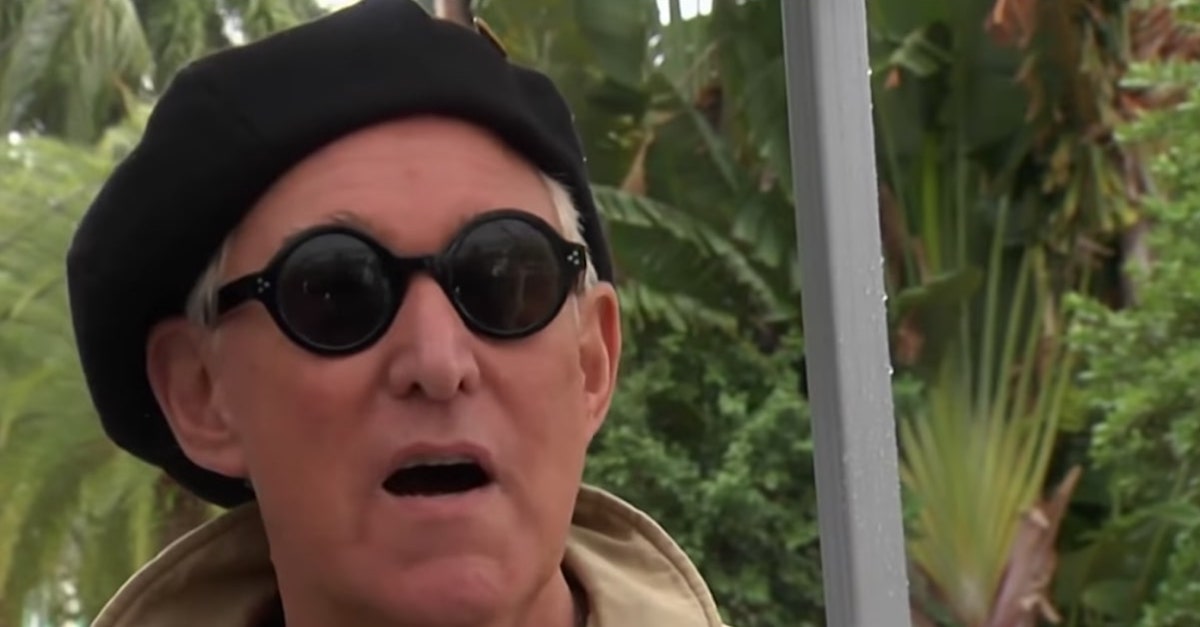
Longtime Trump confidant and adviser Roger Stone learned his fate on Friday: guilty of all charges. Stone’s trial for obstruction, witness tampering and lying to federal investigators (seven counts total) took just a week and a half.
Prosecutors alleged that Stone lied when he testified before the House Intelligence Committee regarding his interactions with WikiLeaks, took steps to obstruct investigations into Russian interference in the 2016 election, and tampered with witness Randy Credico:
After the 2016 U.S. presidential election, the U.S. House of Representatives Permanent Select Committee on Intelligence (“HPSCI”), the U.S. Senate Select Committee on Intelligence (“SSCI”), and the Federal Bureau of Investigation (“FBI”) opened or announced their respective investigations into Russian interference in the 2016 U.S. presidential election, which included investigating STONE’s claims of contact with Organization 1.
In response, STONE took steps to obstruct these investigations. Among other steps to obstruct the investigations, STONE:
a. Made multiple false statements to HPSCI about his interactions regarding Organization 1, and falsely denied possessing records that contained evidence of these interactions; and b. Attempted to persuade a witness to provide false testimony to and withhold pertinent information from the investigations.
On Wednesday, the Department of Justice (DOJ) alleged during closing arguments that Stone lied to protect President Donald Trump.
“Roger Stone lied to the House Intelligence Committee because the truth looked bad,” said Assistant U.S. Attorney Aaron Zelinsky, formerly a member of Robert Mueller’s Special Counsel’s Office. “The truth looked bad for the Trump campaign and the truth looked bad for Donald Trump.”
Prosecutors said that Stone lied during his September 2017 testimony before the House Permanent Select Committee on Intelligence. According to the indictment filed in January, Stone dissembled on five separate occasions about his possession of key emails and texts as well as his relationship with WikiLeaks and discussions with the transparency groups’s publisher Julian Assange.
“Stone testified falsely and misleadingly at [an Intelligence Committee] hearing in or around September 2017,” the indictment reads. “Stone failed to turn over and lied about the existence of responsive records to [congressional] requests about documents; Stone submitted and caused to be submitted a letter to [congressional investigators falsely and misleadingly describing communications with [Randy Credico]; and Stone attempted to have [Credico] testify falsely before [Congress] or prevent him from testifying.”
Such subterfuge, the DOJ alleged, prompted congressional investigators to issue an incomplete and inaccurate report about Russian interference in the 2016 U.S. presidential election. Assistant U.S. attorney Jonathan Kravis also made the point that Stone’s alleged lies kept important evidence out of investigators’ hands.
“Because Stone lied to them,” Kravis told the 14-person-strong jury, “the committee didn’t take that step and now those messages are gone.”
Stone’s defense attorney Bruce Rogow tried to steer jurors in a different direction–focusing not on the technical aspects of his clients’ behavior, but the underlying value and legality of the information Stone allegedly lied about.
“There was no purpose for Mr. Stone to have to lie about anything to protect the [Trump 2016] campaign when the campaign was doing nothing wrong in being interested in this information,” Rogow said, in reference to WikiLeaks document dumps.
Rogow then posed an argument that agitated the prosecution:
So much of this case deals with that question that you need to ask, “So what?”
The jury was given their instructions on Thursday. On Friday, they reached a verdict and convicted Stone of all charges, signaling that they didn’t buy the “so what?” argument whatsoever. Sentencing has been set for Feb. 6.
Colin Kalmbacher contributed to this report.
[Image via Image via MSNBC screengrab]